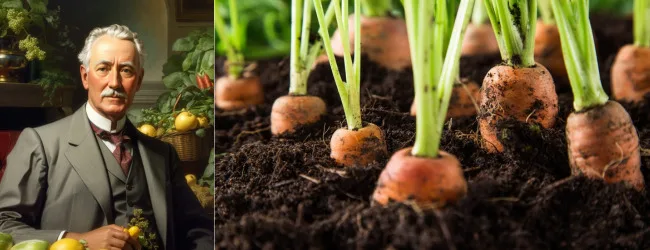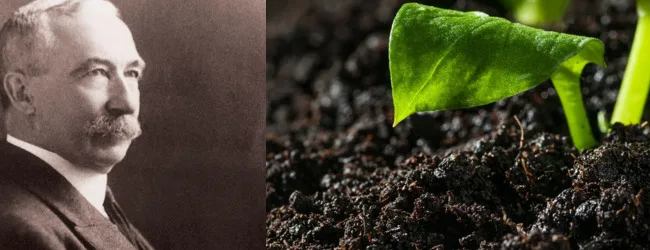Table of contents
- Who Was Sir Albert Howard?
- What Made Him the Father of Organic Farming?
- Important Works of Sir Albert Howard
- Principles of Organic Farming Inspired by Sir Albert Howard
- Sir Albert Howard’s Work in India
- Organic Farming in 2025: Relevance of Sir Howard’s Ideas
- Impact and Legacy
- Timeline of Organic Farming Evolution
- Why Students, Farmers & Policy Makers Should Know Sir Albert Howard
- Conclusion
- Frequently Asked Questions (FAQs)
When we talk about the roots of sustainable agriculture, one name that stands out is Sir Albert Howard, widely regarded as the father of organic farming. In a world dominated by chemicals and industrial farming, his ideas, born in the early 20th century, are more relevant than ever in 2025—championing healthy soil, natural processes, and environmental harmony.
Who Was Sir Albert Howard?

Sir Albert Howard (1873–1947) was a British botanist and agricultural researcher who revolutionised the way we view soil, crops, and farming systems. His research in India laid the groundwork for what we now call organic farming.
🔍 Quick Facts:
| Attribute | Details |
|---|---|
| Full Name | Sir Albert Howard |
| Birth | December 8, 1873 – England |
| Death | October 20, 1947 |
| Known As | Father of Organic Farming |
| Major Contribution | The Indore Method of composting |
| Work Location | Pusa Institute, Bihar, India (now IARI) |
What Made Him the Father of Organic Farming?
🚜 Key Contributions:
- Observed Traditional Indian Farming: He learned from Indian farmers and respected their natural, chemical-free methods.
- Introduced the Indore Method: A composting technique that improves soil fertility using organic waste.
- Authored Groundbreaking Books: An Agricultural Testament (1940) became the bible of organic agriculture.
- Challenged Chemical Agriculture: Warned against artificial fertilisers and pesticides early on.
- Promoted Soil Health: Believed that “the health of soil, plant, animal, and man is one and indivisible.”
Important Works of Sir Albert Howard
| Year | Work | Significance |
|---|---|---|
| 1940 | An Agricultural Testament | Introduced organic farming principles |
| 1945 | The Soil and Health | Linked human health to soil quality |
| 1931–1935 | Indore Method Experiments | Practical application of organic composting |
Highlight: The Indore Method is still considered a gold standard for composting organic waste in developing regions.
Principles of Organic Farming Inspired by Sir Albert Howard
Organic farming is built on several key ideas that originated from Sir Howard’s work:
📌 Core Principles:
- Soil fertility through natural compost.
- No use of synthetic fertilisers or pesticides.
- Crop rotation and mixed farming for sustainability.
- Closed-loop system using local resources.
- Animal welfare is part of the ecosystem.
Sir Albert Howard’s Work in India
Sir Howard spent over 25 years in India, particularly at the Pusa Agricultural Institute in Bihar and Indore, Madhya Pradesh.
🔑 Major Learnings from Indian Agriculture:
- Indian farmers practised composting, crop diversity, and seasonal planting.
- Howard documented these indigenous techniques and improved them scientifically.
- His “Indore Method” was directly inspired by Indian village practices.
Note: His Indian experience was crucial in shaping the organic movement globally.
💡 Pro Tip: If you want to start a Business but have too many doubts, connect with a Business expert from Boss Wallah for guidance – Check Out
Organic Farming in 2025: Relevance of Sir Howard’s Ideas
| Issue | Modern Practice | Howard’s Vision |
|---|---|---|
| Soil Degradation | Chemical Fertilizers | Compost-based soil health |
| Climate Change | Industrial Farming | Local, low-carbon farming |
| Food Safety | Pesticide Residue | Natural pest management |
| Water Pollution | Agrochemicals | Organic mulching & rotation |
Sir Albert Howard’s ideas have become the foundation for global organic certification standards, including those of IFOAM, USDA Organic, and India’s NPOP.
Impact and Legacy
- Inspired the Organic Movement in Europe & America.
- Influenced pioneers like J.I. Rodale (USA), Eve Balfour (UK).
- Helped launch the Soil Association in 1946.
- Still cited in modern agricultural policies and textbooks.
Key Insight: In an era of GMOs and agrochemicals, his back-to-nature philosophy is now a solution to global environmental problems.
ALSO READ | Organic Farming in Sikkim (2025): India’s First Fully Organic State & Its Success Story
Timeline of Organic Farming Evolution
| Year | Event |
|---|---|
| 1905 | Howard arrives in India |
| 1931–35 | Develops Indore Method |
| 1940 | An Agricultural Testament published |
| 1946 | IFOAM (International Federation of Organic Agriculture Movements) was established |
| 1972 | IFOAM (International Federation of Organic Agriculture Movements) established |
| 2000s–2025 | Organic farming grows globally |
ALSO READ | Top 10 Organic Farming States in India: Organic Hotspots of the Country
Why Students, Farmers & Policy Makers Should Know Sir Albert Howard

- Understanding his methods promotes sustainable agriculture.
- His books offer timeless insights for climate-resilient farming.
- Policy makers can design better soil health schemes.
- Students can learn from a true blend of science and tradition.
Need Expert Guidance?
Starting a business can be challenging, but you don’t have to do it alone! At Boss Wallah, our 2,000+ business experts are ready to provide valuable insights and guidance. Whether you need help with marketing, finance, sourcing, or any other area of any business, our business experts are here to help you succeed
Confused about Which Business to Start?
Want to start your own business but unsure which one to choose? Explore Boss Wallah, where you’ll find 500+ courses by successful business owners, featuring practical, step-by-step guides on starting and growing various businesses.
Find your perfect business idea today
Conclusion
Sir Albert Howard is more than just the father of organic farming —he is a visionary whose timeless methods are helping fight today’s ecological crisis. In 2025, with environmental sustainability more crucial than ever, Howard’s principles light the way toward a greener, healthier planet. If we want to save our soil, food, and health, embracing his philosophy is no longer a choice—it’s a necessity.
Frequently Asked Questions (FAQs)
Sir Albert Howard is widely regarded as the father of organic farming for his pioneering work in soil health and composting.
He developed key organic practices like the Indore Method and promoted natural soil fertility.
A composting technique developed by Howard using plant waste, animal manure, and soil to improve soil health naturally.
He worked at the Pusa Institute (now IARI) in Bihar and later in Indore, Madhya Pradesh.
He wrote An Agricultural Testament in 1940, a landmark book in organic farming.
Organic farming avoids synthetic inputs and focuses on soil health, whereas chemical farming uses fertilisers and pesticides
His sustainable methods combat modern issues like climate change, soil erosion, and food toxicity.
Composting, crop rotation, mulching, mixed cropping, and the use of biofertilizers.
Yes, his work inspired the Soil Association (UK) and laid the groundwork for global organic certification systems.
Read Howard’s books or refer to the websites of IFOAM, FAO, and India’s NPOP for guidelines and training.


